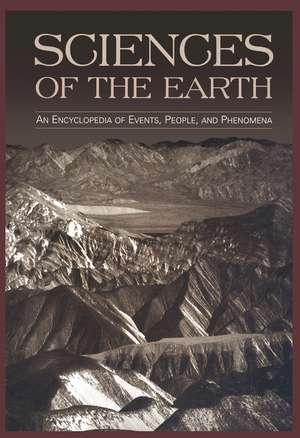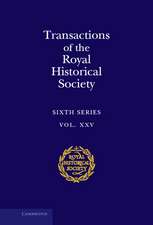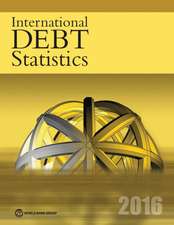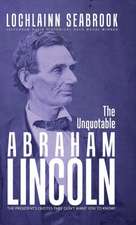Sciences of the Earth: An Encyclopedia of Events, People, and Phenomena
Editat de Gregory A. Gooden Limba Engleză Hardback – apr 1998
In two millenia, our knowledge of the planet and its natural laws and forces has undergone remarkable changes--from the religious belief of earth as the center of the universe to the modern astronomers' view that it is a mere speck in the cosmos. Now a first-of-its-kind reference work charts this remarkable intellectual progression in our evolving perception of the earth by surveying the history of geology, geography, geophysics, oceanography, meteorology, space science, and many other fields.
Covers human understanding of the Earth in various times and cultures
The Encyclopedia traces our understanding of the earth and its functioning throughout history, summarizing historical explanations of earthly occurrences, including explanations with no scientific basis. It presents the latest facts and theories, explains how our understanding of the earth has evolved, and shows why many outrageous and fanciful earlier ideas were accepted in their time. The coverage explores the physical phenomena that inform our knowledge, starting at the earth's core and extending outward through the mantle, crust, oceans, and atmosphere to the magnetosphere and beyond.
Charts the evolution of our perceptions
The primary focus of the Encyclopedia is the history of the study of the earth. It also discusses the institutions that advanced and shaped science and probes the interplay between science, practical applications, and social and political forces. The result is a unified historical overview of the earth across a wide canvas of time and place, from antiquity to the space age. Its wide-ranging articles summarize subjects as diverse as geography and imperialism, environmentalism, computers and meteorology, ozone formation theories since 1800, scientific rocketry, the Scopes trial, and much more.
Special Features
Shows how diverse disciplines, from geology to space science, fit together in a coherent view of the earth * Explains earlier ideas and theories in the context of the beliefs and scientific knowledge of their time * Spotlights important institutions that have shaped the history of science * Explores relationships between science, practical applications, and sociopolitical concerns * Provides a subject index and an index of scientists with birth/death dates
Preț: 1858.22 lei
Preț vechi: 2480.61 lei
-25% Nou
Puncte Express: 2787
Preț estimativ în valută:
355.62€ • 369.90$ • 293.58£
355.62€ • 369.90$ • 293.58£
Carte tipărită la comandă
Livrare economică 14-28 aprilie
Preluare comenzi: 021 569.72.76
Specificații
ISBN-13: 9780815300625
ISBN-10: 081530062X
Pagini: 938
Dimensiuni: 178 x 254 x 31 mm
Greutate: 2.47 kg
Ediția:New.
Editura: Taylor & Francis
Colecția Routledge
Locul publicării:Oxford, United Kingdom
ISBN-10: 081530062X
Pagini: 938
Dimensiuni: 178 x 254 x 31 mm
Greutate: 2.47 kg
Ediția:New.
Editura: Taylor & Francis
Colecția Routledge
Locul publicării:Oxford, United Kingdom
Notă biografică
Gregory A. Good is Associate Professor in the History Department at West Virginia University.
Recenzii
Easy-to-understand essays by experts in the field
Tracing the history of the oldest science from the ancient world to the space age, this encyclopedia begins with a brilliant synopsis of the development of astronomy from preliterate cultures to the present and ends with the biography of the pioneer astrophysicist Fritz Zwicky. Requiring no advanced knowledge of mathematics or physics it brings together current scholarly thinking and the state of the art of astronomy in over 300 carefully researched and easy-to-grasp essays-each written and signed by an expert.
Covers key fields, individuals, and institutions
Major entries explore the historical development of the major fields of astronomy: astrophysics, celestial mechanics, solar system astronomy, and the study of variable stars, comets, double stars, and nebulae. Experts discuss the growth of astronomy in nations and regions: United States, Latin America, Japan, Australia, New Zealand. There are biographies of important individuals and histories of landmark institutions.
The work of top instrument experts
Illustrated entries by leading experts on the development of astronomical instrumentation range from the astrolabe to the Hubble Space Telescope. Historians of science discuss important topics in the social history of astronomy, such as the history of amateurs, literature and astronomy, women in astronomy, astronomy and the Roman Catholic Church, and the search for extraterrestrial intelligence.
Special features:
Covers astronomy from early cultures to the present * Includes more than 300 authoritative essays * Contains biographies of important individuals and histories of landmark institutions * Explores the historical development of the major fields of astronomy * International entries chart astronomy in Latin America, Japan, Australia, New Zealand, and the United States * Main Selection of the Astronomy Book Club
Entries cover five categories:
Historical overviews (calendars, telescopes) * Observatories (Royal Greenwich Observatory, Paris Observatory) * Regional contexts (England, France, China) * Social history (women in astronomy, Copernican Revolution) * Biographies (Euler, Lindblad, Newton )
Tracing the history of the oldest science from the ancient world to the space age, this encyclopedia begins with a brilliant synopsis of the development of astronomy from preliterate cultures to the present and ends with the biography of the pioneer astrophysicist Fritz Zwicky. Requiring no advanced knowledge of mathematics or physics it brings together current scholarly thinking and the state of the art of astronomy in over 300 carefully researched and easy-to-grasp essays-each written and signed by an expert.
Covers key fields, individuals, and institutions
Major entries explore the historical development of the major fields of astronomy: astrophysics, celestial mechanics, solar system astronomy, and the study of variable stars, comets, double stars, and nebulae. Experts discuss the growth of astronomy in nations and regions: United States, Latin America, Japan, Australia, New Zealand. There are biographies of important individuals and histories of landmark institutions.
The work of top instrument experts
Illustrated entries by leading experts on the development of astronomical instrumentation range from the astrolabe to the Hubble Space Telescope. Historians of science discuss important topics in the social history of astronomy, such as the history of amateurs, literature and astronomy, women in astronomy, astronomy and the Roman Catholic Church, and the search for extraterrestrial intelligence.
Special features:
Covers astronomy from early cultures to the present * Includes more than 300 authoritative essays * Contains biographies of important individuals and histories of landmark institutions * Explores the historical development of the major fields of astronomy * International entries chart astronomy in Latin America, Japan, Australia, New Zealand, and the United States * Main Selection of the Astronomy Book Club
Entries cover five categories:
Historical overviews (calendars, telescopes) * Observatories (Royal Greenwich Observatory, Paris Observatory) * Regional contexts (England, France, China) * Social history (women in astronomy, Copernican Revolution) * Biographies (Euler, Lindblad, Newton )











